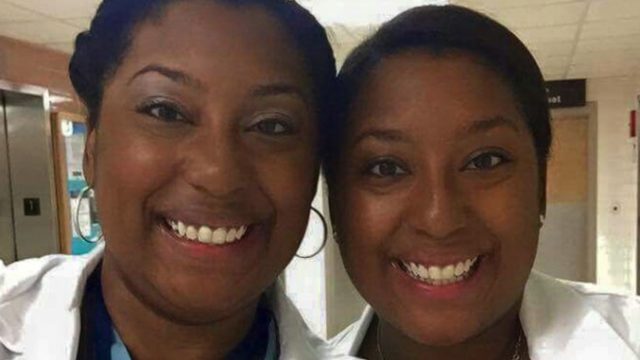By Stacy M. Brown
NNPA Newswire Correspondent
They are sisters – twins to be correct – and both are medical doctors and were born and raised in a town in Ohio called Twinsburg, a segregated, lower-income and primarily African American area.
Both say they’ve always been drawn to science and excelled academically which led to each being in Advanced Placement and Honors courses in school.
Frequently the only African Americans in their classrooms, the twins endured their share of racism. There’s a pressure to perform and be on when you’re the only person of color in a space, lest you inadvertently perpetuate stereotypes about your race to non-people of color, they said.
But, none of that prevented them from succeeding.
Both would go on to become elected as chief residents in their respective residency programs at the University of Illinois and today they are practicing physicians whose primary patients include many in underserved populations in Chicago – Brandi in the Department of Psychiatry and Brittani in the College of Medicine-Family Medicine.
In an effort to give back, the twins have co-founded Medlikeme.com, a resource for high school, pre-med and others to submit questions that will be answered by medical students, physicians and other professionals.
The website is scheduled to launch Nov. 5.
In a Q&A with NNPA Newswire, they spoke about their lives and profession.
NNPA: At what point did you decide you were going to be a doctor?
Brittani: I was not the kid that knew from an early age that I wanted to be a doctor. It was a slow realization. I do think the lack of societal images of black doctors made it hard for me to visualize myself in that role. I’ve always loved science and found enjoyment helping others, but being a doctor wasn’t something that honestly clicked as a viable option until the second half of college, after I saw a black female doctor, in person, for the first time in my life.
Brandi: I also decided in college. I had the opportunity to study abroad in East Africa (my first time leaving the country!). As part of my program, I visited a hospital in Uganda. I remember that all of the doctors and the nurses looked like me. I was mesmerized as I watched them do their work. After that semester, I knew for
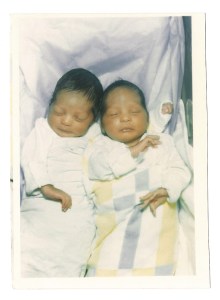
sure that I wanted to be one of them. I had considered being a doctor long before that but being in a hospital full of black doctors somehow made it feel more attainable.
NNPA: When you look at the numbers, the stats, obviously there are very few African American doctors and even fewer African American women doctors. Was that a factor in your decision to be a doctor?
Brittani: The fact that there are very few African American doctors wasn’t a huge factor in my original decision to become a doctor. It is, however, something that both made the journey more challenging and ultimately more rewarding. It’s hard to envision yourself as something you don’t see. But as I got further into medicine, I realized that maybe I could be a visual reminder to someone who looks like me, that they can be anything. At least that’s my hope.
Brandi: When I decided to become a doctor, I did think about the fact there are few African Americans in the field. Knowing that didn’t exactly motivate me. In fact, intimidated me. For much of my training, I felt like medicine was not meant for a person like me. It took years for me to feel like I was just as smart and capable as my classmates. Now, I know that I bring a unique perspective to medicine that the field desperately needs. When most people think of a doctor, they don’t picture an African American woman. My sister and I want to change that.
NNPA: When did you realize or find out that your sister would also become a doctor?
Brittani: I had done a pre-med summer program in New York City, and I remember telling Brandi about it. It was through that program that I got my first taste of what it was like to be a doctor and I was hooked. I was in the OR and saw a beating human heart. That changes you. I started thinking about medicine seriously then and talked to Brandi about it. I told her about seeing a black female doctor and how amazing that was. I started to believe I could do it and I think that rubbed off on her.
Brandi: It did rub off on me. By the time I studied abroad in Uganda during college, the seed had already been planted. Knowing that my sister and I would be going on the journey together made the decision much less nerve-wracking. We were each other’s biggest supporters throughout our journeys. I don’t know if I would have had the courage to pursue medicine if I did not have my sister by my side. We were each other’s inspiration.
NNPA: What has been your biggest challenge in pursuing and then ultimately becoming a doctor?
Brittani: My biggest challenge came in the first few years of 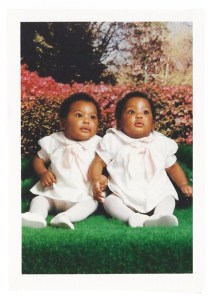 medical school. I had a very difficult transition. Brandi and I decided to go to different medical schools, in an experiment in a way, since we had always been with each other our entire lives. We wanted to learn who we were apart from each other. What I didn’t realize how much support I was losing by being away from her. I struggled to adjust. I felt like an imposter in those days; like I wasn’t smart or capable enough to be where I was. It took years to figure out that that was not true. It was a lie I believed for a long time about myself, until I realized that I was bringing something valuable and unique to medicine that isn’t common. The academics actually came easier after that, and everything else fell into place.
medical school. I had a very difficult transition. Brandi and I decided to go to different medical schools, in an experiment in a way, since we had always been with each other our entire lives. We wanted to learn who we were apart from each other. What I didn’t realize how much support I was losing by being away from her. I struggled to adjust. I felt like an imposter in those days; like I wasn’t smart or capable enough to be where I was. It took years to figure out that that was not true. It was a lie I believed for a long time about myself, until I realized that I was bringing something valuable and unique to medicine that isn’t common. The academics actually came easier after that, and everything else fell into place.
Brandi: I think Brittani said it best. Those years that we were separated in medical school were really tough! I took a lot of train rides to visit Brittani during those years. I went through a similar “imposter syndrome” during medical school. I didn’t realize how much I had internalized the belief that I was not “supposed” to be a doctor. Overcoming that false belief was the most important things I did in my life.
NNPA: How can academic institutions and even families help improve the number of Black doctors in the country? Why do you believe African Americans shy away or at least fail to consider the medical profession?
Brittani: That’s a big question with a complicated answer. One reason I think African Americans shy away from the medical profession is because they don’t see representations growing up of black physicians. Most of us do not have doctors in the family or have friends who are doctors.
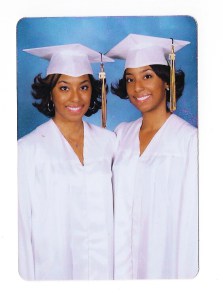 On top of that, there are very few media representations of African Americans being doctors or holding other science-related careers. Again, it’s hard to imagine yourself being something you don’t see. So, I think those of us in medicine who are African Americans do have a responsibility to be as visible when we can manage, as a means of showing the next generation what’s possible.
On top of that, there are very few media representations of African Americans being doctors or holding other science-related careers. Again, it’s hard to imagine yourself being something you don’t see. So, I think those of us in medicine who are African Americans do have a responsibility to be as visible when we can manage, as a means of showing the next generation what’s possible.
There is also a very large barrier to entry to the medical field. It’s a confusing thing to navigate if you do not have someone showing you the way. There’s also the extreme financial burden it places on applicants. That financial burden hits the African American community to a disproportionate extent as we are more likely than our peers to be from socioeconomically-disadvantaged backgrounds. There is institutional racism and sexism which are seamlessly built into our higher education and healthcare system to contend with as well. Those systems exert their damage in both overt and subtle ways over time. Those forces hurt you in material ways.
They undermine your confidence and hinder your ability to perform at your peak. With that in mind, a lot of us, especially African Americans, are starting off with additional barriers.
Brandi: As far as institutions go, I think too many operate under the premise that their work is done once they get a handful of African American or other minority students through their doors.
That shouldn’t be the case. There are so many unique challenges that students of color face in higher education, that if institutions are serious about supporting diversity, they really have to be intentional about putting support systems in place. It’s not just about getting African Americans through the door but helping them thrive in an environment that was not designed with them in mind, as higher education was not.
NNPA: What’s your primary message to other black women who might aspire to be a doctor?
Brittani: I want them to know that although the road is long, it is worth it. At the end of the day, on the other side of the struggle, there are real people who need someone like you in their corner, fighting the good fight alongside them. Medicine needs you. Your future patients need you. You got this!
Brandi: You are smart. You are powerful. And you belong in medicine. Quiet the voices (inside and outside) that tell you differently. Your future patients will benefit from the perspective you bring, and your unique identity is your greatest asset. Remember that you are not alone.
NNPA: Which one of you are older and is there any pride being the older twin?
Brittani: I’m older (by two whole minutes!) and I like to think 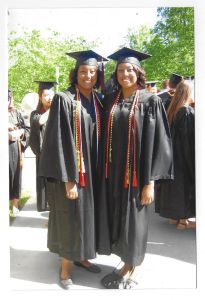 wiser as well! After all, I learned a lot about the world in those two minutes.
wiser as well! After all, I learned a lot about the world in those two minutes.
Brandi: Older does not necessarily mean wiser…clearly.
NNPA: Are you at all surprised at yours and your sister’s success?
Brittani: It’s surreal to have made it through medical school and residency and to be a practicing physician. It has been my “impossible” dream for so long. I think before I always thought of doctors as these superhuman beings that were just unreachable. Now I know that we doctors struggle and make mistakes just like everyone else. We are painfully human.
On the other hand, I believe a lot of success is a mental game. A lot of my strength came from my family and other loved ones, who always lovingly reminded me who I was. They overwhelmed me with positivity and support whenever I stumbled on this journey. Over time, I came to believe in myself the way they did. Once I started truly believing in myself and my abilities, I got to the point where no negativity I encountered could keep me down for long. I just kept getting back up. When you have that attitude, I believe success is inevitable.
Brandi: Brittani put it beautifully, and I agree. I feel humbled by all that we have achieved. I’m looking forward to helping other achieve the same success.
NNPA: Can you describe MedLikeMe?
Brittani: MedLikeMe is a free online community dedicated to minorities and non-traditional students who are interested in pursuing a career in medicine. In essence, we wanted to create the resource we wish we’d had when we were trying to figure out how to be doctors. High schoolers, pre-med and other pre-health students submit questions on the site, and real medical students, physicians and other professionals answer their questions. It is our attempt to bridge the gap between minorities and non-traditional students who are interested in medicine but don’t know where to start and those who have lived it. We also hope to highlight and share the stories of practicing professionals who have overcome struggle to succeed so that those in the community can have a source of inspiration. It’s definitely a work of passion.
Brandi: For us, it’s not enough to say, “we made it”. We want to help others do it too. It’s our way of giving back for the hundreds of people who have helped us on our journey through medicine. We want to pay it forward. We’re hoping to change the face of medicine, together.
For more information about their website, visit http://beta.medlikeme.com/our-story/. Additional information about the doctors can also be found at http://www.uifightdepression.psych.uic.edu/psych.uic.edu

